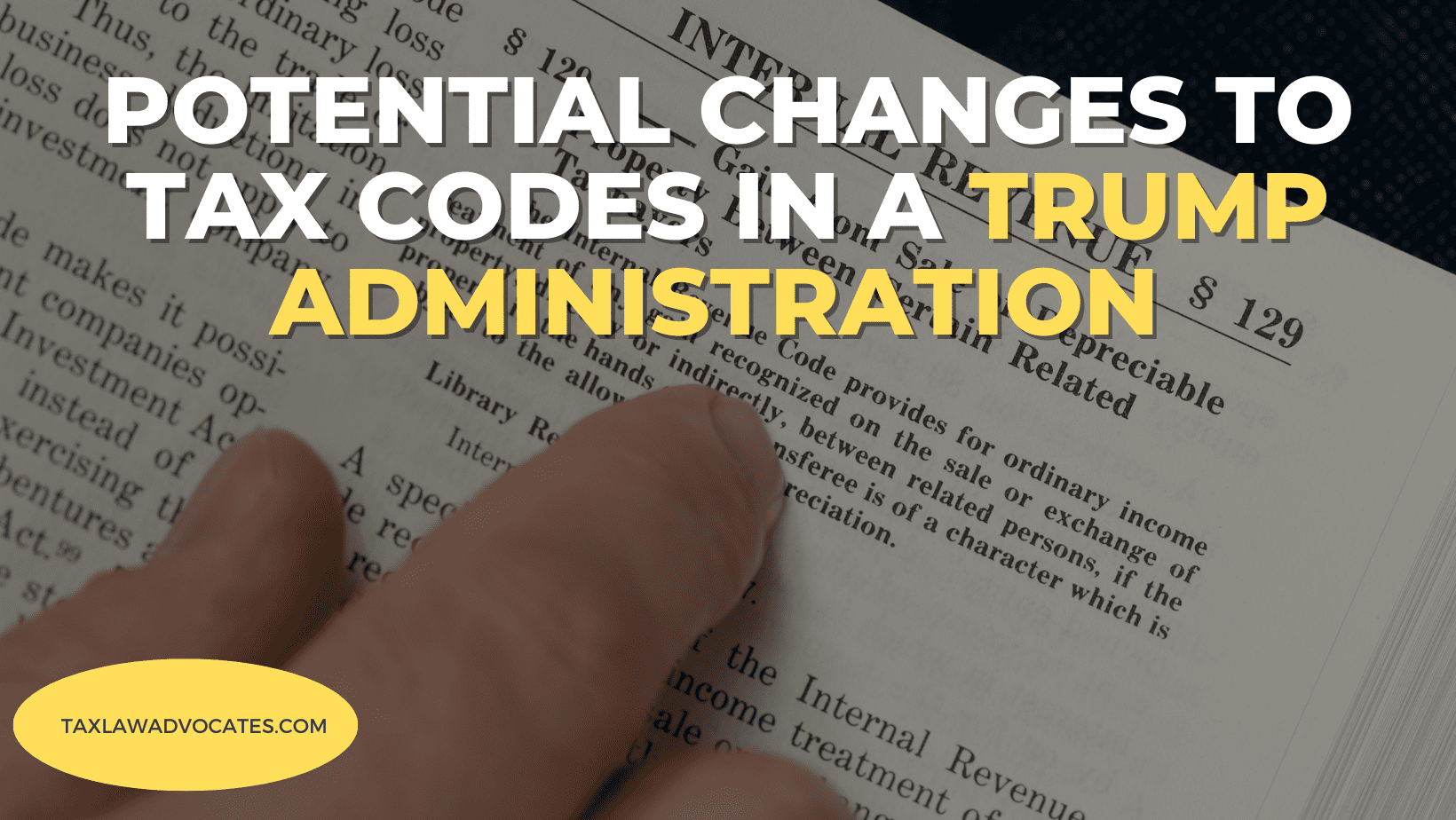As former President Donald Trump’s tax policies take center stage again, taxpayers and businesses across the country are preparing for potential significant shifts in the tax code. A new Trump administration is expected to prioritize extending the 2017 Tax Cuts and Jobs Act (TCJA) provisions, revising corporate and individual tax rates, and potentially repealing portions of the Inflation Reduction Act (IRA). For taxpayers, especially those planning for the future, understanding these potential changes is essential to making informed financial decisions.
At Tax Law Advocates, we specialize in helping individuals and businesses navigate complex tax laws and find relief from tax burdens. If you have questions about how these potential changes may impact your finances or need assistance in tax planning, our team of federally licensed enrolled agents, tax attorneys, and accountants is ready to help. Contact us today at 855-612-7777.
Trump’s Tax Reform Agenda
The 2017 TCJA represented the most comprehensive overhaul of the U.S. tax code in decades. Many of its provisions, particularly those affecting individuals and small businesses, are set to sunset at the end of 2025 unless renewed. A new Trump administration is expected to push for the extension or even expansion of these provisions. Here are some key aspects of Trump’s tax reform agenda:
1. Corporate Tax Reforms
One of Trump’s hallmark proposals is reducing the corporate tax rate on domestic activity to 15%, down from the current 21%. This would further incentivize businesses to invest domestically. Additionally, the administration is expected to reconsider other TCJA business provisions, such as:
– Restoring 100% bonus depreciation for capital expenditures, which dropped to 60% in 2024.
– Revising the interest deduction limitation under Section 163(j), potentially reinstating the EBITDA metric for calculating allowable deductions.
– Addressing the deductibility of R&D expenses, which became amortized under the TCJA but may be restored to full deductibility.
2. Individual Tax Provisions
For individual taxpayers, the potential changes include:
– Eliminating or increasing the $10,000 cap on SALT deductions.
– Extending the higher estate and gift tax exemption—currently $13.99 million but set to revert to pre-TCJA levels in 2026.
– Lowering individual income tax rates, with proposals to reduce the 22% tax bracket to 15% and exempt tip income, overtime pay, and certain Social Security payments from taxation.
– Indexing capital gains to inflation, potentially reducing tax liabilities on long-held investments.
3. Repealing Provisions of the IRA
Trump has been vocal about repealing clean energy tax credits introduced by the Inflation Reduction Act, including incentives for renewable energy projects and electric vehicles. The administration may also target the IRA’s corporate minimum tax and stock buyback tax, though these repeals would face scrutiny due to their high cost.
Key Considerations for Taxpayers in 2025 Planning
With potential tax code changes on the horizon, individuals and businesses in Columbus, Ohio, and nationwide should take proactive steps in their year-end and 2025 planning. Here are a few considerations:
1. Deferring Income
Businesses expecting a corporate tax rate reduction to 15% in 2025 might consider deferring income to take advantage of lower rates. Similarly, individuals in higher tax brackets should monitor rate changes to determine the most tax-efficient timing for income recognition.
2. Accelerating Deductions
If the administration restores 100% bonus depreciation, businesses may want to defer capital expenditures to 2025. Conversely, accelerating deductions into 2024 may be beneficial if changes to bonus depreciation or R&D expensing are delayed.
3. Estate Planning
The current estate and gift tax exemption offers significant opportunities for high-net-worth individuals to transfer wealth tax-free. Given the potential reversion to pre-TCJA levels, taxpayers should consider leveraging these exemptions before 2026.
4. Planning for SALT Deductions
Individuals in high-tax states like California, New York, and Illinois should consider deferring state tax payments to 2025, as changes to the SALT cap could increase allowable deductions.
5. Fixed Asset Strategies
Businesses facing limits on interest deductibility should explore options to capitalize interest costs or reclassify expenses as deductible repairs under tangible property regulations.
Challenges to Implementing Tax Reforms
While the Trump administration may have ambitious tax reform plans, the path to implementation is complex. Key challenges include:
- Legislative Constraints: With narrow Republican majorities in Congress, passing tax reforms may require using the reconciliation process, which imposes strict budgetary limits.
- Deficit Concerns: Extending the TCJA is projected to cost $4.6 trillion over the next decade, raising concerns among fiscal conservatives.
- Internal Party Differences: Republicans hold varying views on tax policy priorities, which may lead to contentious negotiations over issues like the SALT cap and corporate tax rates.
How Tax Law Advocates Can Help
Taxpayers need expert guidance to navigate the complexities of tax reform and make informed decisions. That’s where Tax Law Advocates comes in. Our experienced team specializes in tax relief services, including representation before the IRS and state tax authorities, assistance with tax debt resolution, and proactive tax planning.
Our Services Include:
– Tax Planning: We help individuals and businesses develop strategies to minimize tax liabilities and take advantage of potential changes to the tax code.
– Offer in Compromise (OIC): If you owe back taxes, we can help you settle your debt for less than the full amount owed through the IRS’s OIC program.
– Installment Agreements: For taxpayers unable to pay their tax debt in full, we assist in setting up manageable payment plans.
– Audit Representation: If you’re facing an IRS audit, our team provides expert representation to protect your interests.
– Fresh Start Program Assistance: We guide taxpayers through the Fresh Start Program, which includes penalty abatement, lien withdrawal, and streamlined installment agreements.
Take Action Today
Potential tax code changes in a new Trump administration could have far-reaching implications for taxpayers in Columbus and beyond. Whether you’re a business owner planning capital expenditures or an individual seeking to maximize deductions, proactive tax planning is essential.
Let Tax Law Advocates help you navigate the uncertainties and secure your financial future. Contact us today at 855-612-7777 to schedule a consultation. Don’t wait—start preparing for the future of tax reform with the trusted experts at Tax Law Advocates.






